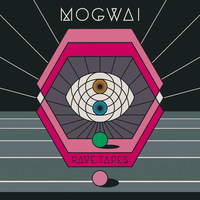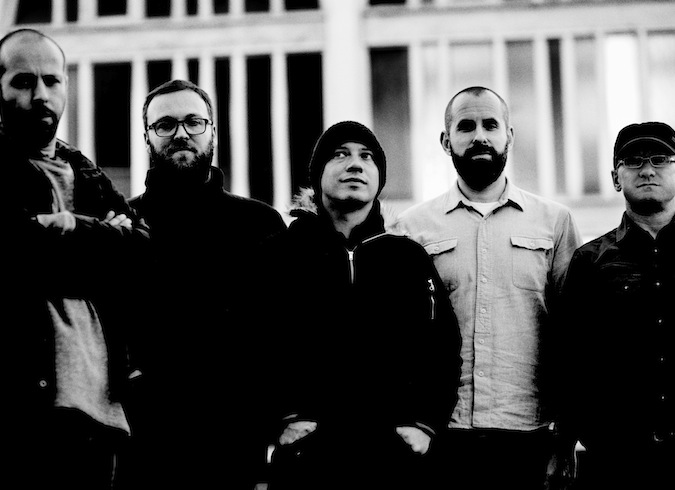 Mogwai: Rave Tapes (Sub Pop, 1/21/14)
Mogwai: Rave Tapes (Sub Pop, 1/21/14)
“Remurdered”
What I’ve always liked about Mogwai is not only the band’s sense of the absurd, but also the intelligence with which it has funneled that feeling into its music and allowed it to saturate the bulk of its recorded output. You can read it in the roving, ridiculous names of its songs (“You’re Lionel Richie,” for example) and hear it in the scraps of sampled voices sewn into the background (Iggy Pop’s voice on “Punk Rock,” for instance) and elsewhere, throughout its nearly 20-year career.
When Mogwai began in Glasgow, Scotland, in 1995, no one could have predicted how this irreverence would circulate through the band’s work and continue to hold appeal with fans almost two decades later. The five-piece does not consciously put this sentiment in the foreground of its music; it is not over-the-top affectations but something more primeval that draws listeners in. It whispers at the periphery, like a phrase repeated in a dream that makes perfect sense while you are asleep but sounds so inconceivably stupid and infantile when you wake up and try to share its meaning.
Mogwai is a mostly instrumental outfit that rarely dabbles in singing. Its music appeals to contemplatives—see “Mogwai Fear Satan,” the 16-minute closer of studio debut Mogwai Young Team—forcing listeners to ask more questions than they’ll ever get answered. With this in mind, I put a few of my own questions to Mogwai’s Barry Burns, who plays guitars and keyboards, programs computers, and conducts interviews with rabid fans. Burns, a genial sort with a disarming laugh, talks with me about art from his flat in Berlin, where he now lives with his wife. He gives me a glimpse into how Mogwai has endured and built an international presence through near-nonstop touring and recording and also talks about the band’s eighth full-length album, Rave Tapes, released in January, and the soundtrack it recorded—released as an EP in early 2013—for the French supernatural TV series Les Revenants.
Rave Tapes, the follow-up to 2011 album Hardcore Will Never Die, But You Will, is a compendium of melancholy-happy pseudo-EDM blips that shines a light—albeit dim and unsustained—into some of the darker corners of the familiar rooms of sound that the band previously has inhabited. But though the uplifting, cinematic quality of the Mogwai brand taps into the more aspirational parts of our psyches, the darkness always bleeds through to scowl at—if not displace—where the light has landed us. Profit and debt, optimism and discouragement, virtue and sin—the contrast shifts back and forth, forever.
As with past albums, Rave Tapes carries on the tradition of absurdist placeholder-text-for-feeling composition titles. This time, we have the bewilderingly named track “Repelish,” the gist of which Burns describes as a small misunderstanding that took on added meaning. “Our drummer Martin [Bulloch]’s mother used to mean ‘replenish,’ but she would actually say ‘repelish,’” he explains. “So she would say to her husband, ‘Could you please repelish my drink?’ We just thought it was funny. But the actual content of the song was that sort of sample about Led Zeppelin—we just happened to find that about two days before we had to finish the record. It’s fucking amazing, but it’s so stupid.”
The sample to which Burns refers is adequately described. In it, a young man makes sneering allegations about “backmasking” Satanic messages onto the tape of Led Zeppelin’s classic “Stairway to Heaven.” Backmasking is a process wherein sound engineers record backward certain voices or sounds meant to be played forward. The technique enables the insertion of secret or subliminal messages into recordings, though it’s debatable in most identified cases whether the intent of this is real or imagined. Either way, in “Repelish,” this sample of a man rambling on about Satanism in Zeppelin songs is both hilarious and absurd in that we hear how the tiresome evangelistic outlook posited by the speaker colors his world—but it’s also chilling when “backdropped” against Mogwai’s winding, eerie synthesizers and a clean, uplifting guitar line. It’s a nice effect.
This is the kind of stuff Mogwai that used to do a lot—use strange samples to contrast the bombast or somberness of its music. What the band is less known for is singing its own lyrics to create more traditionally structured commercial “songs.” Rave Tapes does include the aptly named, morose “Blues Hour,” on which Stuart Braithwaite muses about death in a whispered hush. This is the only track that features “traditional” singing, and it’s just as haunting—if a bit more bleak—as “Take Me Somewhere Nice” on Rock Action or “Cody” on Come on Die Young. When I press Burns about what is happening with the indiscernible lyrics on Rave Tapes’ standout last song, “The Lord Is Out of Control,” suggesting that perhaps the band tried a bit of backmasking of its own here, he’s more interested in talking about the process by which the band made it—he used a vocoder to distort his voice as the song’s starting point.
“If we have a song that we deem sort of unfinished, we might resort to samples or singing or vocoder,” Burns says. “That last song was created primarily with a vocoder in mind. It’s the first time we’ve done that.” He doesn’t delve in to the song’s content, but he does say that Mogwai’s vocals are “usually an afterthought.”
Another thing the band has become increasingly known for is lending its talents to scoring films and television shows. Previously, Mogwai soundtracked Darren Aronofsky’s film The Fountain and Douglas Gordon’s Zidane: A 21st Century Portrait. More recently, it has done the aforementioned Les Revenants, and in the summer of 2013 performed a handful of live shows to accompany screenings of Zidane, which was a 2006 documentary about French footballer Zinedine Zidane.
“Everything we’ve done like this—TV or, say, extracurricular activities—we never get much input,” Burns says. “It’s always just up to a television or movie schedule, where they don’t have a finished product for you to watch. So you get a script or maybe 10 minutes [of footage] where you are supposed to get what it is meant to feel like. And often they say, ‘Can you just make up some music that you think is going to fit in?’ And we make a bunch of music, and then they sort of pick through it and try to piece it together in a way that suits their vision.” He also cites the importance of working with producers who are on the same page as the band. “You really have to work with good people, otherwise it’s a fucking riot.”
Though Burns notes that these “extra-curriculars” are particularly labor intensive, he is grateful for the opportunities. “It’s really nice to do something that isn’t specifically just a Mogwai album; it’s really good fun,” says Burns, adding that he hopes the band will be able to write and perform music for the second season of Les Revenants.
After nearly 20 years, Mogwai fans have all but cut the once-vaguely-useful but now scowl-inducing descriptor post-rock from their vocabularies. It’s worth noting, however, that the first time I heard someone say this was when a friend dropped the needle on Come on Die Young in 1999. Yes, the term has fallen out favor, but it still is charged with meaning. Mogwai too continues to have a particular valence in these post-post-rock times. The band has aged with grace, and its music continues to reflect subtle shifts in popular culture, its own surge in popularity, and even critics’ responses to the latter. It may no longer “fear Satan” as such, but that’s because Mogwai has raised the bar to a level where heaven and hell, quiet and loud, and inside and out no longer matter quite as much.

